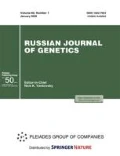Abstract
Molecular genetic study of the CFTR gene in cystic fibrosis patients from the Chuvash Republic is presented. We found linkage disequilibrium of the disease with 22-7-16-13 haplotype using intragenic markers. Major mutation p.E92K was revealed in chromosomes carrying this haplotype. The frequency of this mutation in Chuvash patients was 66.6%. Population study of the distribution of two mutations (p.E92K and F508del) of the CFTR gene revealed that their population frequency in heterozygous carriers was one per 37 subjects while calculated cystic fibrosis frequency in Chuvashia is one per 5420 newborns.
Similar content being viewed by others
References
De Boeck, K., Wilschanski, M., Castellani, C., et al., Cystic Fibrosis: Terminology and Diagnostic Algorithms, Thorax, 2006, vol. 61, pp. 627–35.
Riordan, J.R., Rommens, J.M., Kerem, B., et al., Identification of the Cystic Fibrosis Gene: Cloning and Characterization of Complementary DNA, Science, 1989, vol. 245, pp. 1066–1073.
Davies, J.C., Griesenbach, U., Geddes, D.M., and Alton, E.W.F.W., Cystic Fibrosis, in Encyclopedia of Life Sciences, 2005, pp. 1–8.
Kerem, B. and Kerem, E., The Molecular Basis for Disease Variability in Cystic Fibrosis, Eur. J. Hum. Genet., 1996, vol. 4, pp. 65–73.
Bobadilla, J.L., Macek, M., Jr., Fine, J.P., and Farrell, P.M., Cystic Fibrosis: A Worldwide Analysis of CFTR Mutations-Correlation with Incidence Data and Application to Screening, Hum. Mutat. Jun., 2002, vol. 19, no. 6, pp. 575–606.
Petrova, N.V. and Ginter E.K., Ten-Year Experience in Molecular Genetic Diagnosis of Cystic Fibrosis in the Medical Genetic Research Center, Russian Academy of Medical Sciences, Pulmonologiya, 2001, vol. 11, no. 3, pp. 17–20.
Petrova, N.V., Molecular and Genetic, Clinical and Genotypic Characteristics of Cystic Fibrosis in Russian Populations, Extended Abstract of Doctoral (Biol.) Dissertation, Ìed. genet. nauch. tsentr Ross. àkad. Ìed. nauk, Moscow, 2009, p. 14.
Diaz, G.A., Gelb, B.D., Risch, N., et al., Gaucher Disease: The Origins of the Ashkenazi Jewish N370S and 84GG Acid Beta-Glucosidase Mutations, Am. J. Hum. Genet., 2000, vol. 66, pp. 1821–1832.
Nunes, V., Chill, M., Dfirk, T., et al., A New Missense Mutation (E92K) in the First Transmembrane Domain of the CFTR Gene Causes a Benign Cystic Fibrosis Phenotype, Hum. Mol. Genet., 1993, vol. 2, no. 1, pp. 79–80.
Stanke, F., Ballmann, M., Bronsveld, I., et al., Diversity of the Basic Defect of Homozygous CFTR Mutation Genotypes in Humans, J. Med. Genet., 2008, vol. 45, pp. 47–54.
Casals, T., Gimnez, J., Ramos, M.D., et al., Analysis of the CFTR Gene Confirms the High Genetic Heterogeneity of the Spanish Population: 43 Mutations Account for Only 78% of CF Chromosomes, Hum. Genet., 1994, vol. 93, pp. 447–451.
Lu, Y., Xiong, X., Helm, A., et al., Co- and Posttranslational Translocation Mechanisms Direct Cystic Fibrosis Transmembrane Conductance Regulator N Terminus Transmembrane Assembly, J. Biol. Chem., 1998, vol. 273, pp. 568–576.
Cosson, P., Lankford, S.P., Bonifacino, J.S., and Klausner, R.D., Membrane Protein Association by Potential Intramembrane Charge Pairs, Nature, 1991, vol. 351 p, pp. 414–416.
Hartmann, E., Rapoport, T.A., and Lodish, H.F., Predicting the Orientation of Eukaryotic Membrane-Spanning Proteins, Proc. Natl. Acad. Sci. U.S.A., 1989, vol. 86, pp. 5786–5790.
Parks, G.D. and Lamb, R.A., Topology of Eukaryotic Type II Membrane Proteins: Importance of N-Terminal Positively Charged Residues Flanking the Hydrophobic Domain, Cell, 1991, vol. 64, pp. 777–787.
Szczesna-Skorupa, E., Browne, N., Mead, D., and Kemper, B., Positive Charges at the NH2 Terminus Convert the Membrane-Anchor Signal Peptide of Cytochrome P-450 to a Secretory Signal Peptide, Proc. Natl. Acad. Sci. U.S.A., 1988, vol. 85, pp. 738–742.
Chen, M. and Zhang, J.T., Topogenesis of Cystic Fibrosis Transmembrane Conductance Regulator (CFTR): Regulation by the Amino Terminal Transmembrane Sequences, Biochemistry, 1999, vol. 38, pp. 5471–5477.
Akabas, M.H., Kaufmann, C., Cook, T.A., and Archdeacon, P., Amino Acid Residues Lining the Chloride Channel of the Cystic Fibrosis Transmembrane Conductance Regulator, J. Biol. Chem., 1994, vol. 269, pp. 14865–14868.
Ivanov, V., Ethnic Geography of Chuvash People, Cheboksary: Chuvashskoe Knizhnoe Izd., 2005.
Author information
Authors and Affiliations
Corresponding author
Additional information
Original Russian Text © A.A. Stepanova, A.V. Abrukova, E.N. Savaskina, A.V. Polyakov, 2012, published in Genetika, 2012, Vol. 48, No. 7, pp. 863–871.
Rights and permissions
About this article
Cite this article
Stepanova, A.A., Abrukova, A.V., Savaskina, E.N. et al. Mutation p.E92K is the primary cause of cystic fibrosis in Chuvashes. Russ J Genet 48, 731–737 (2012). https://doi.org/10.1134/S1022795412060166
Received:
Accepted:
Published:
Issue Date:
DOI: https://doi.org/10.1134/S1022795412060166



